The purpose of this qualitative study is to examine the adaptational lived experiences of parenting a child with Cerebral Palsy or other mobility issues from a dual parental perspective living in an urban metropolitan city in California. The study will use a purposive sample of 16 parents (who have children between the ages of 5 to 15) who will be completing semi-structured interviews utilizing video platforms. The Transformation Clinical Model will be used to guide this study as the theoretical framework to identify joys, challenges, and expectations of raising a disabled child. Research findings from this phenomenological study may be used to increase awareness in the Cerebral Palsy community, increase empathy and understanding of parental needs, and potentially improve access to resources that are needed by parents to enhance their quality of life.
Who is eligible?
- Parents who have a child that has been a client receiving services from United Cerebral Palsy of the Golden Gate from six to 12 months.
- Parents who have a child between the ages of 5 to 15 who has Cerebral Palsy or other mobility issues.
- Speaks fluent English
- Must be married and living in the same household (8 mothers & 8 fathers needed)
What will I need to do?
Study participants will complete a consent form once they are interested in participating and then will complete an interview via a video conferencing platform or by phone interview lasting approximately 30-60 minutes.
Will I be compensated?
Unfortunately no.
Why is this research so important?
Participants will be contributing to help increase awareness of the disability, increase awareness within the community, increase empathy and understanding of parental needs, and potentially improve access to resources that are needed by parents to enhance their quality of life.
If interested, please contact the student researcher below for more information
Email or call Ellena Arden if interested in participating
For more information: ellena.arden@waldenu.edu or 209-992-6822
Supervising Chair to the research study: Dr. Edoardo Naggiar
ed.naggiar@mail.waldenu.edu
Posted on January 31st, 2021
The purpose of this study is to learn about how disabled people living in the Bay Area and receiving social security benefits make ends meet. Researchers are interested to learn from your experiences of navigating the guidelines of Social Security programs, work-related restrictions and opportunities, and the effects of it all on your daily life.
Please click on the provided link below for further information.
Tags: Volunteer Study
Posted on January 31st, 2021
Dear Friends and Colleagues,
After 29 distribution trips to 19 countries we thought we had a full understanding of the need for wheelchairs in the developing world. However, what we saw in Uganda was heartbreaking and has made us even more committed to providing mobility to those in need.
The incidence and the severity of people with disabilities in Northern Uganda was much more than anything we had experienced. We delivered approximately 100 wheelchairs in each of five regional towns where the local Rotary Clubs had preapproved each recipient. Word of the distributions spread and in every town there were 30 or 40 additional people who crawled (some for miles) to the distribution site hoping they too would receive a wheelchair. They didn’t feel entitled, they didn’t beg or get angry, they just sat there on the ground staring up at us hoping there would be an extra wheelchair. When we were done they crawled away, maybe it would be their turn next time. We were overwhelmed with emotion at our last distribution in the town of Arua (on the border with Congo). That day my son Josh and I made a commitment to each other that we would send more wheelchairs to Northern Uganda in 2018.
The good news is that we were able to change the lives of 530 people (and their families) who had never had a wheelchair. The majority of the recipients have been disabled from birth and literally spent their entire life crawling, often for decades.
We have hundreds of photos and nearly as many stories that we would love to be able to share. The two photos will give you just a small glimpse into the reality that we experienced. The boy in the first photo is from Gulu and his mother told us that he had become too big to carry and it was hard to keep his wounds clean. As you can see, he is neat and clean except for the obvious signs of a life of crawling. The gentleman on the ground sat right in front of us throughout the distribution in Soroti. He never said anything, just watched and listened intently. When the last wheelchair was distributed he quietly crawled away.
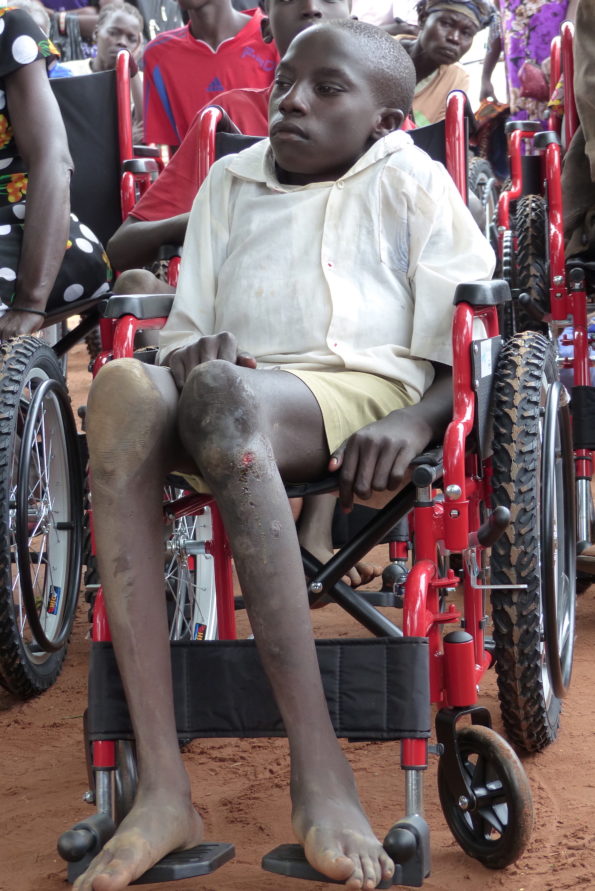
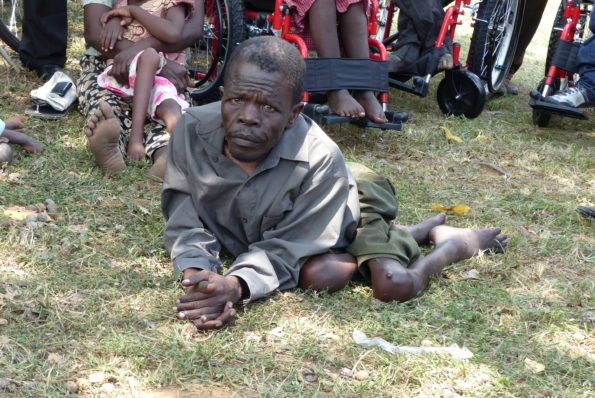
Mobility provides freedom which in turn creates independence, dignity and hope for the future. It is hard for us to describe all of the emotions we have experienced but we know that none of this would be possible without your generous contributions. You can get a feel for our distributions from these short videos that were on Ugandan TV.
1) https://www.youtube.com/watch?v=yiz8A4QgqeM&sns=em
2) https://www.youtube.com/watch?v=4rfS6jDC-FM&sns=em
Since we last wrote to you in October 2016:
- We delivered 530 wheelchairs to Uganda in July.
- Our ‘From the Heart – Schools Project’ raised $61,000 and 20 teachers, students and parents distributed 280 wheelchairs to Argentina in June.
- We provided a $21,000 matching grant to the Rotary Club of Pleasanton who delivered 280 wheelchairs to Peru in September.
Our plans for 2018 with your donations:
- $42,000 for a container of 280 wheelchairs for Northern Uganda.
- $21,000 to a fund that has been created for wheelchairs going to the hurricane victims in Florida, Texas and Puerto Rico and the fire victims in Northern California.
- $21,000 matching grant for a container of 280 wheelchairs going to the earthquake victims in Mexico.
- $7,000 to the Rotary Club of Pleasanton towards a container of 280 wheelchairs they plan to deliver to rural Chile in May.
The cost to sponsor each wheelchair remains at $150. These are wheelchairs that retail for as much as $500 in the US but due to supply and demand in the developing world they can cost more than US$1,000 making wheelchairs an unattainable luxury for the vast majority of people.
Last year 136 of you donated $71,082. In addition, our good friend and partner on the distribution trips, Bill Wheeler (owner of Black Tie Transportation) raised $15,380 bringing last year’s total to $86,462 exceeding our goal of $84,000. Thank you for your incredible generosity! This year our combined goal is $91,000.
Josh and I are asking you to help us change people’s lives overnight by giving them the gift of mobility. Your donation of $75 can be combined with others to buy a wheelchair. Or you can donate $150 for one wheelchair, $300 for two wheelchairs, $750 for five wheelchairs, etc. If you can help, please make your check payable directly to “Wheelchair Foundation” and send it to us (preferably by December 31st) at:
Don and Josh Routh
101 Greenwich Ct
San Ramon, CA 94582
You can also make donations via credit card directly on the secure Wheelchair Foundation web site. Just click on this link and complete the required fields.
https://www.wheelchairfoundation.org/give/
Please be sure to complete the section that says “I would like to apply my donation to:” by clicking on either “Don & Josh Routh Wheelchair Projects” or “PwC Wheelchair Project”.
Remember that 100% of your contribution goes directly for the program cost of manufacturing and transporting the wheelchairs. Josh and I, along with our fellow donor-guests pay all of our own expenses (airfare, hotel, meals, etc.) and our hosts in the receiving country (typically Rotary Clubs, Foundations, Ministries of Health, etc.) pay all taxes and tariffs along with the local distribution costs. Your donations are entirely tax deductible and you will receive a letter of appreciation along with a photo certificate from the Wheelchair Foundation (a 501c3) for tax purposes. Please contact me about Matching Gifts from your employer. For Matching Gift purposes it may be necessary to know that the Wheelchair Foundation is a subsidiary of the Behring Global Educational Foundation, a 501c3 (Tax ID # 94-3353881). You may also want to consider donating part of the Required Minimum Distribution (RMD) from your IRA without paying tax on the distribution (check with your CPA).
As donors, you are always welcome to join us on one of our distribution trips. We can promise that it will be a life changing experience…and a lot of fun!
A sincere thank you for your time and your donation,
With Gratitude,
Don and Josh
Posted on October 31st, 2017
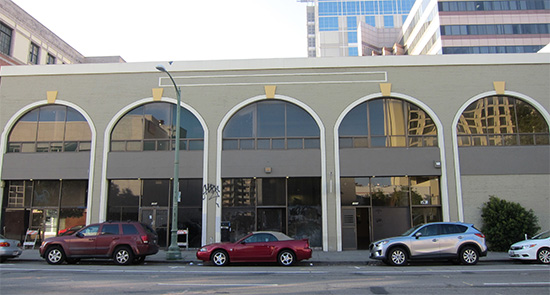
In December 2012, UCP of the Golden Gate acquired this beautiful 34,000 square foot building at 1521 Webster Street in downtown Oakland, California. Over time we intend to develop this facility into a multifaceted service platform that will provide programs and services in education, technology, and wellness to children and adults with all manner of disabilities from throughout the Bay Area. This central downtown location is ideal for our efforts to raise societal awareness of people with disabilities and help our clients become more integrated into the community.
In order to turn our “platform of dreams” into a reality, we need your help. Please donate what you can to support our efforts to make the Bay Area more inclusive. You can donate using the button below or by sending a check to: UCP of the Golden Gate, 1521 Webster Street, Oakland, CA 94612.
Posted on June 7th, 2014
Budget cuts are forcing larger class sizes, bigger case loads and leaving schools with too few staff to meet the needs of students with disabilities, special educators say.
Read More Here
Posted on December 10th, 2013
Faced with the possibility of more funding cuts, a new survey finds special educators across the country are worried.
Already, 86 percent of special education directors say they are seeing increased caseloads, while most also report that services are less available for students with disabilities, according to a survey of more than 300 administrators conducted by the Council for Exceptional Children, a national group that lobbies on behalf of special educators.
And the situation may soon get worse. Under a budget deal last year, federal funding for special education and many other initiatives is expected to face an across-the-board cut of 8 percent starting in January 2013 under a process known as sequestration.
If the cuts go through as expected, the vast majority of special education administrators surveyed indicated that caseloads would increase further, funding for technology and other resources would decline, and there would be greater strain on the availability of services for students.
Read the full article from the Disability Scoop.
Posted on June 26th, 2012
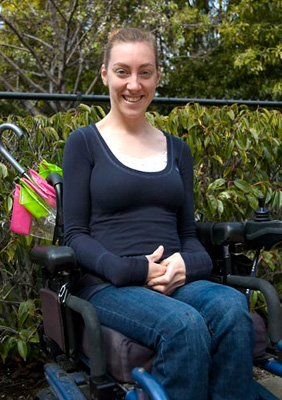 BERKELEY — Even in middle school, Alva Gardner had her fashion standards. Jeans made expressly for wheelchair users — cut high in the back, low in the front, velcroed at the fly — seemed like a potential boon.
BERKELEY — Even in middle school, Alva Gardner had her fashion standards. Jeans made expressly for wheelchair users — cut high in the back, low in the front, velcroed at the fly — seemed like a potential boon.
But when the mail-order pants arrived on her doorstep, Gardner, then 13 or 14, refused to wear them. Although easier for her to put on and take off than standard jeans, they were baggy and ugly, recalls the UC Berkeley undergrad. And baggy and ugly, she says, “would not have been good for my social life.”
Fast forward to 2012: Gardner, now a 22-year-old Berkeley senior, aspires to work in the clothing industry — designing for people, women especially, whose bodies don’t fit the “norm” (a word she utters ironically, aided by air quotes).
Read more.
Posted on May 16th, 2012
Tyler Austin is one of thousands of Canadians who can now speak, thanks to MyVoice, a new technology developed by two University of Toronto students.
Tyler, 18, is from Toronto and has cerebral palsy, which affects his muscle control and makes it difficult for him to speak. Until now, he had to depend on pointing to a few words on a board on his wheelchair to express himself. It was frustrating for everyone.
Read more.
Posted on May 15th, 2012
Often reviled for encouraging kids to spend too much time in front of screens, new research suggests that some video games may actually benefit those with cerebral palsy.
The finding comes from a new study in which researchers observed 17 children with cerebral palsy as they played four “active games” on the Nintendo Wii — Bowling, Tennis, Boxing and Dance Dance Revolution.
Read more.
Posted on May 15th, 2012
Transportation is a major obstacle for people with disabilities, with more than 500,000 never leaving their homes simply because they lack a way to get around, according to a new report.
The reasons vary, but the report out this week from The American Association of People with Disabilities and The Leadership Conference Education Fund found extensive problems for those living in both urban and rural locales when it comes to getting from point A to point B.
Read more.
Posted on May 15th, 2012
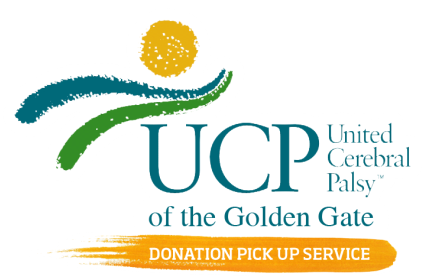





 BERKELEY — Even in middle school, Alva Gardner had her fashion standards. Jeans made expressly for wheelchair users — cut high in the back, low in the front, velcroed at the fly — seemed like a potential boon.
BERKELEY — Even in middle school, Alva Gardner had her fashion standards. Jeans made expressly for wheelchair users — cut high in the back, low in the front, velcroed at the fly — seemed like a potential boon.